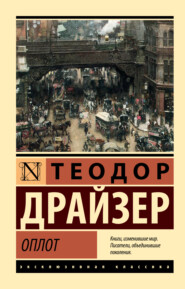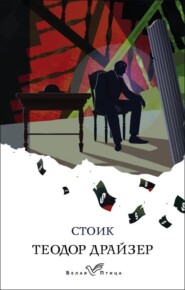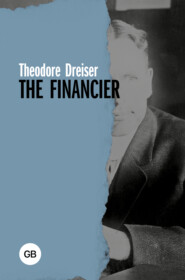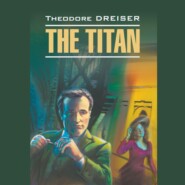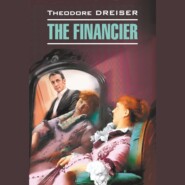По всем вопросам обращайтесь на: info@litportal.ru
(©) 2003-2025.
✖
The Titan / Титан
Настройки чтения
Размер шрифта
Высота строк
Поля
Cowperwood smiled. “So he calls them 'sheers,' does he?” he thought. “Good! I think I'll like him.”
He introduced himself as coming from Philadelphia, and went on to say that he was interested in various Chicago ventures, inclined to invest in any good stock which would rise, and particularly desirous to buy into some corporation – public utility preferred – which would be certain to grow with the expansion of the city.
Old Laughlin, who was now all of sixty years of age, owned a seat on the Board, and was worth in the neighborhood of two hundred thousand dollars, looked at Cowperwood quizzically.
“Well, now, if you'd 'a' come along here ten or fifteen years ago you might 'a' got in on the ground floor of a lot of things,” he observed. “There was these here gas companies, now, that them Otway and Apperson boys got in on, and then all these here street-railways. Why, I'm the feller that told Eddie Parkinson what a fine thing he could make out of it if he would go and organize that North State Street line. He promised me a bunch of sheers if he ever worked it out, but he never give 'em to me. I didn't expect him to, though,” he added, wisely, and with a glint. “I'm too old a trader for that. He's out of it now, anyway. That Michaels-Kennelly crowd skinned him. Yep, if you'd 'a' been here ten or fifteen years ago you might 'a' got in on that. 'Tain't no use a-thinkin' about that, though, any more. Them sheers is sellin' fer clost onto a hundred and sixty.”
Cowperwood smiled. “Well, Mr. Laughlin,” he observed, “you must have been on 'change a long time here. You seem to know a good deal of what has gone on in the past.”
“Yep, ever since 1852,” replied the old man. He had a thick growth of upstanding hair looking not unlike a rooster's comb, a long and what threatened eventually to become a Punch-and-Judy chin, a slightly aquiline nose, high cheek-bones, and hollow, brown-skinned cheeks. His eyes were as clear and sharp as those of a lynx.
“To tell you the truth, Mr. Laughlin,” went on Cowperwood, “what I'm really out here in Chicago for is to find a man with whom I can go into partnership in the brokerage business. Now I'm in the banking and brokerage business myself in the East. I have a firm in Philadelphia and a seat on both the New York and Philadelphia exchanges. I have some affairs in Fargo also. Any trade agency can tell you about me. You have a Board of Trade seat here, and no doubt you do some New York and Philadelphia exchange business. The new firm, if you would go in with me, could handle it all direct. I'm a rather emphasis outside man myself. I'm thinking of locating permanently in Chicago. What would you say now to going into business with me? Do you think we could get along in the same office space?”
Cowperwood had a way, when he wanted to be pleasant, of beating the fingers of his two hands together, finger for finger, tip for tip. He also smiled at the same time – or, rather, beamed – his eyes glowing with a warm, magnetic, seemingly affectionate light.
As it happened, old Peter Laughlin had arrived at that psychological moment when he was wishing that some such opportunity as this might appear and be available. He was a lonely man, never having been able to bring himself to trust his peculiar temperament in the hands of any woman. As a matter of fact, he had never understood women at all, his relations being confined to those sad immoralities of the cheapest character which only money – grudgingly given, at that – could buy. He lived in three small rooms in West Harrison Street, near Throup, where he cooked his own meals at times. His one companion was a small spaniel, simple and affectionate, a she dog, Jennie by name, with whom he slept. Jennie was a docile, loving companion, waiting for him patiently by day in his office until he was ready to go home at night. He talked to this spaniel quite as he would to a human being (even more intimately, perhaps), taking the dog's glances, tail-waggings, and general movements for answer. In the morning when he arose, which was often as early as half past four, or even four – he was a brief sleeper – he would begin by pulling on his trousers (he seldom bathed any more except at a down-town barber shop) and talking to Jennie.
“Git up, now, Jinnie,” he would say. “It's time to git up. We've got to make our coffee now and git some breakfast. I can see yuh, lyin' there, pertendin' to be asleep. Come on, now! You've had sleep enough. You've been sleepin' as long as I have.”
Jennie would be watching him out of the corner of one loving eye, her tail tap-tapping on the bed, her free ear going up and down.
When he was fully dressed, his face and hands washed, his old string tie pulled around into a loose and convenient knot, his hair brushed upward, Jennie would get up and jump demonstratively about, as much as to say, “You see how prompt I am.”
“That's the way,” old Laughlin would comment. “Allers last. Yuh never git up first, do yuh, Jinnie? Allers let yer old man do that, don't you?”
On bitter days, when the car-wheels squeaked and one's ears and fingers seemed to be in danger of freezing, old Laughlin, arrayed in a heavy, dusty greatcoat of ancient vintage and a square hat, would carry Jennie down-town in a greenish-black bag along with some of his beloved “sheers” which he was meditating on. Only then could he take Jennie in the cars. On other days they would walk, for he liked exercise. He would get to his office as early as seven-thirty or eight, though business did not usually begin until after nine, and remain until four-thirty or five, reading the papers or calculating during the hours when there were no customers. Then he would take Jennie and go for a walk or to call on some business acquaintance. His home room, the newspapers, the floor of the exchange, his offices, and the streets were his only resources. He cared nothing for plays, books, pictures, music – and for women only in his one-angled, mentally impoverished way. His limitations were so marked that to a lover of character like Cowperwood he was fascinating – but Cowperwood only used character. He never idled over it long artistically.
As Cowperwood suspected, what old Laughlin did not know about Chicago financial conditions, deals, opportunities, and individuals was scarcely worth knowing. Being only a trader by instinct, neither an organizer nor an executive, he had never been able to make any great constructive use of his knowledge. His gains and his losses he took with reasonable equanimity, exclaiming over and over, when he lost: “Shucks! I hadn't orter have done that,” and snapping his fingers. When he won heavily or was winning he munched tobacco with a seraphic smile and occasionally in the midst of trading would exclaim: “You fellers better come in. It's a-gonta rain some more.” He was not easy to trap in any small gambling game, and only lost or won when there was a free, open struggle in the market, or when he was engineering some little scheme of his own.
The matter of this partnership was not arranged at once, although it did not take long. Old Peter Laughlin wanted to think it over, although he had immediately developed a personal fancy for Cowperwood. In a way he was the latter's victim and servant from the start. They met day after day to discuss various details and terms; finally, true to his instincts, old Peter demanded a full half interest.
“Now, you don't want that much, Laughlin,” Cowperwood suggested, quite blandly. They were sitting in Laughlin's private office between four and five in the afternoon, and Laughlin was chewing tobacco with the sense of having a fine, interesting problem before him. “I have a seat on the New York Stock Exchange,” he went on, “and that's worth forty thousand dollars. My seat on the Philadelphia exchange is worth more than yours here. They will naturally figure as the principal assets of the firm. It's to be in your name. I'll be liberal with you, though. Instead of a third, which would be fair, I'll make it forty-nine per cent., and we'll call the firm Peter Laughlin & Co. I like you, and I think you can be of a lot of use to me. I know you will make more money through me than you have alone. I could go in with a lot of these silk-stocking fellows around here, but I don't want to. You'd better decide right now, and let's get to work.”
Old Laughlin was pleased beyond measure that young Cowperwood should want to go in with him. He had become aware of late that all of the young, smug newcomers on 'change considered him an old fogy. Here was a emphasis, brave young Easterner, twenty years his junior, evidently as shrewd as himself – more so, he feared – who actually proposed a business alliance. Besides, Cowperwood, in his young, healthy, aggressive way, was like a breath of spring.
“I ain't keerin' so much about the name,” rejoined Laughlin. “You can fix it that-a-way if you want to. Givin' you fifty-one per cent. gives you charge of this here shebang. All right, though; I ain't a-kickin'. I guess I can manage allus to git what's a-comin' to me.
“It's a bargain, then,” said Cowperwood. “We'll want new offices, Laughlin, don't you think? This one's a little dark.”
“Fix it up any way you like, Mr. Cowperwood. It's all the same to me. I'll be glad to see how yer do it.”
In a week the details were completed, and two weeks later the sign of Peter Laughlin & Co., grain and commission merchants, appeared over the door of a handsome suite of rooms on the ground floor of a corner at La Salle and Madison, in the heart of the Chicago financial district.
“Get onto old Laughlin, will you?” one broker observed to another, as they passed the new, pretentious commission-house with its splendid plate-glass windows, and observed the heavy, ornate bronze sign placed on either side of the door, which was located exactly on the corner. “What's struck him? I thought he was almost all through. Who's the Company?”
“I don't know. Some fellow from the East, I think.”
“Well, he's certainly moving up. Look at the plate glass, will you?”
It was thus that Frank Algernon Cowperwood's Chicago financial career was definitely launched.
Chapter V
Concerning A Wife And Family
If any one fancies for a moment that this commercial move on the part of Cowperwood was either hasty or ill-considered they but little appreciate the incisive, apprehensive psychology of the man. His thoughts as to life and control (tempered and hardened by thirteen months of reflection in the Eastern District Penitentiary) had given him a fixed policy. He could, should, and would rule alone. No man must ever again have the least claim on him save that of a suppliant. He wanted no more dangerous combinations such as he had had with Stener, the man through whom he had lost so much in Philadelphia, and others. By right of financial intellect and courage he was first, and would so prove it. Men must swing around him as planets around the sun.
Moreover, since his fall from grace in Philadelphia he had come to think that never again, perhaps, could he hope to become socially acceptable in the sense in which the so-called best society of a city interprets the phrase; and pondering over this at odd moments, he realized that his future allies in all probability would not be among the rich and socially important – the clannish, snobbish elements of society – but among the beginners and financially emphasis men who had come or were coming up from the bottom, and who had no social hopes whatsoever. There were many such. If through luck and effort he became sufficiently powerful financially he might then hope to dictate to society. Individualistic and even anarchistic in character, and without a shred of true democracy, yet temperamentally he was in sympathy with the mass more than he was with the class, and he understood the mass better. Perhaps this, in a way, will explain his desire to connect himself with a personality so naive and strange as Peter Laughlin. He had annexed him as a surgeon selects a special knife or instrument for an operation, and, shrewd as old Laughlin was, he was destined to be no more than a tool in Cowperwood's emphasis hands, a mere hustling messenger, content to take orders from this swiftest of moving brains. For the present Cowperwood was satisfied to do business under the firm name of Peter Laughlin & Co. – as a matter of fact, he preferred it; for he could thus keep himself sufficiently inconspicuous to avoid undue attention, and gradually work out one or two coups by which he hoped to firmly fix himself in the financial future of Chicago.
As the most essential preliminary to the social as well as the financial establishment of himself and Aileen in Chicago, Harper Steger, Cowperwood's lawyer, was doing his best all this while to ingratiate himself in the confidence of Mrs. Cowperwood, who had no faith in lawyers any more than she had in her recalcitrant husband. She was now a tall, severe, and rather plain woman, but still bearing the marks of the former passive charm that had once interested Cowperwood. Notable crows'-feet had come about the corners of her nose, mouth, and eyes. She had a remote, censorious, subdued, self-righteous, and even injured air.
The cat-like Steger, who had all the graceful contemplative air of a prowling Tom, was just the person to deal with her. A more suavely cunning and opportunistic soul never was. His motto might well have been, speak softly and step lightly.
“My dear Mrs. Cowperwood,” he argued, seated in her modest West Philadelphia parlor one spring afternoon, “I need not tell you what a remarkable man your husband is, nor how useless it is to combat him. Admitting all his faults – and we can agree, if you please, that they are many” – Mrs. Cowperwood stirred with irritation – “still it is not worth while to attempt to hold him to a strict account. You know” – and Mr. Steger opened his thin, artistic hands in a deprecatory way – “what sort of a man Mr. Cowperwood is, and whether he can be coerced or not. He is not an ordinary man, Mrs. Cowperwood. No man could have gone through what he has and be where he is to-day, and be an average man. If you take my advice you will let him go his way. Grant him a divorce. He is willing, even anxious to make a definite provision for you and your children. He will, I am sure, look liberally after their future. But he is becoming very irritable over your unwillingness to give him a legal separation, and unless you do I am very much afraid that the whole matter will be thrown into the courts. If, before it comes to that, I could effect an arrangement agreeable to you, I would be much pleased. As you know, I have been greatly grieved by the whole course of your recent affairs. I am intensely sorry that things are as they are.”
Mr. Steger lifted his eyes in a very pained, deprecatory way. He regretted deeply the shifty currents of this troubled world.
Mrs. Cowperwood for perhaps the fifteenth or twentieth time heard him to the end in patience. Cowperwood would not return. Steger was as much her friend as any other lawyer would be. Besides, he was socially agreeable to her. Despite his Machiavellian profession, she half believed him. He went over, tactfully, a score of additional points. Finally, on the twenty-first visit, and with seemingly great distress, he told her that her husband had decided to break with her financially, to pay no more bills, and do nothing until his responsibility had been fixed by the courts, and that he, Steger, was about to retire from the case. Mrs. Cowperwood felt that she must yield; she named her ultimatum. If he would fix two hundred thousand dollars on her and the children (this was Cowperwood's own suggestion) and later on do something commercially for their only son, Frank, junior, she would let him go. She disliked to do it. She knew that it meant the triumph of Aileen Butler, such as it was. But, after all, that wretched creature had been properly disgraced in Philadelphia. It was not likely she could ever raise her head socially anywhere any more. She agreed to file a plea which Steger would draw up for her, and by that oily gentleman's machinations it was finally wormed through the local court in the most secret manner imaginable. The merest item in three of the Philadelphia papers some six weeks later reported that a divorce had been granted. When Mrs. Cowperwood read it she wondered greatly that so little attention had been attracted by it. She had feared a much more extended comment. She little knew the cat-like prowlings, legal and journalistic, of her husband's interesting counsel. When Cowperwood read it on one of his visits to Chicago he heaved a sigh of relief. At last it was really true. Now he could make Aileen his wife. He telegraphed her an enigmatic message of congratulation. When Aileen read it she thrilled from head to foot. Now, shortly, she would become the legal bride of Frank Algernon Cowperwood, the newly enfranchised Chicago financier, and then -
“Oh,” she said, in her Philadelphia home, when she read it, “isn't that splendid! Now I'll be Mrs. Cowperwood. Oh, dear!”
Mrs. Frank Algernon Cowperwood number one, thinking over her husband's liaison, failure, imprisonment, pyrotechnic operations at the time of the Jay Cooke failure, and his present financial ascendancy, wondered at the mystery of life. There must be a God. The Bible said so. Her husband, evil though he was, could not be utterly bad, for he had made ample provision for her, and the children liked him. Certainly, at the time of the criminal prosecution he was no worse than some others who had gone free. Yet he had been convicted, and she was sorry for that and had always been. He was an able and ruthless man. She hardly knew what to think. The one person she really did blame was the wretched, vain, empty-headed, ungodly Aileen Butler, who had been his seductress and was probably now to be his wife. God would punish her, no doubt. He must. So she went to church on Sundays and tried to believe, come what might, that all was for the best.
Chapter VI
The New Queen of the Home
The day Cowperwood and Aileen were married – it was in an obscure village called Dalston, near Pittsburg, in western Pennsylvania, where they had stopped off to manage this matter – he had said to her: “I want to tell you, dear, that you and I are really beginning life all over. Now it depends on how well we play this game as to how well we succeed. If you will listen to me we won't try to do anything much socially in Chicago for the present. Of course we'll have to meet a few people. That can't be avoided. Mr. and Mrs. Addison are anxious to meet you, and I've delayed too long in that matter as it is. But what I mean is that I don't believe it's advisable to push this social exchange too far. People are sure to begin to make inquiries if we do. My plan is to wait a little while and then build a really fine house so that we won't need to rebuild. We're going to go to Europe next spring, if things go right, and we may get some ideas over there. I'm going to put in a good big gallery,” he concluded. “While we're traveling we might as well see what we can find in the way of pictures and so on.”
Aileen was thrilling with anticipation. “Oh, Frank,” she said to him, quite ecstatically, “you're so wonderful! You do everything you want, don't you?”
“Not quite,” he said, deprecatingly; “but it isn't for not wanting to. Chance has a little to say about some of these chings, Aileen.”
She stood in front of him, as she often did, her plump, ringed hands on his shoulders, and looked into those steady, lucid pools – his eyes. Another man, less leonine, and with all his shifting thoughts, might have had to contend with the handicap of a shifty gaze; he fronted the queries and suspicions of the world with a seeming candor that was as disarming as that of a child. The truth was he believed in himself, and himself only, and thence sprang his courage to think as he pleased. Aileen wondered, but could get no answer.
“Oh, you big tiger!” she said. “You great, big lion! Boo!”
He pinched her cheek and smiled. “Poor Aileen!” he thought. She little knew the unsolvable mystery that he was even to himself – to himself most of all.
Immediately after their marriage Cowperwood and Aileen journeyed to Chicago direct, and took the best rooms that the Tremont provided, for the time being. A little later they heard of a comparatively small furnished house at Twenty-third and Michigan Avenue, which, with horses and carriages thrown in, was to be had for a season or two on lease. They contracted for it at once, installing a butler, servants, and the general service of a well-appointed home. Here, because he thought it was only courteous, and not because he thought it was essential or wise at this time to attempt a social onslaught, he invited the Addisons and one or two others whom he felt sure would come – Alexander Rambaud, president of the Chicago & Northwestern, and his wife, and Taylor Lord, an architect whom he had recently called into consultation and whom he found socially acceptable. Lord, like the Addisons, was in society, but only as a minor figure.
Trust Cowperwood to do the thing as it should be done. The place they had leased was a charming little gray-stone house, with a neat flight of granite, balustraded steps leading up to its wide-arched door, and a judicious use of stained glass to give its interior an artistically subdued atmosphere. Fortunately, it was furnished in good taste. Cowperwood turned over the matter of the dinner to a caterer and decorator. Aileen had nothing to do but dress, and wait, and look her best.
“I needn't tell you,” he said, in the morning, on leaving, “that I want you to look nice to-night, pet. I want the Addisons and Mr. Rambaud to like you.”
A hint was more than sufficient for Aileen, though really it was not needed. On arriving at Chicago she had sought and discovered a French maid. Although she had brought plenty of dresses from Philadelphia, she had been having additional winter costumes prepared by the best and most expensive mistress of the art in Chicago – Theresa Donovan. Only the day before she had welcomed home a golden-yellow silk under heavy green lace, which, with her reddish-gold hair and her white arms and neck, seemed to constitute an unusual harmony. Her boudoir on the night of the dinner presented a veritable riot of silks, satins, laces, lingerie, hair ornaments, perfumes, jewels – anything and everything which might contribute to the feminine art of being beautiful. Once in the throes of a toilet composition, Aileen invariably became restless and energetic, almost fidgety, and her maid, Fadette, was compelled to move quickly. Fresh from her bath, a smooth, ivory Venus, she worked quickly through silken lingerie, stockings and shoes, to her hair. Fadette had an idea to suggest for the hair. Would Madame let her try a new swirl she had seen? Madame would – yes. So there were movings of her mass of rich glinting tresses this way and that. Somehow it would not do. A braided effect was then tried, and instantly discarded; finally a double looping, without braids, low over the forehead, caught back with two dark-green bands, crossing like an X above the center of her forehead and fastened with a diamond sunburst, served admirably. In her filmy, lacy boudoir costume of pink silk Aileen stood up and surveyed herself in the full-length mirror.
“Yes,” she said, turning her head this way and that.
He introduced himself as coming from Philadelphia, and went on to say that he was interested in various Chicago ventures, inclined to invest in any good stock which would rise, and particularly desirous to buy into some corporation – public utility preferred – which would be certain to grow with the expansion of the city.
Old Laughlin, who was now all of sixty years of age, owned a seat on the Board, and was worth in the neighborhood of two hundred thousand dollars, looked at Cowperwood quizzically.
“Well, now, if you'd 'a' come along here ten or fifteen years ago you might 'a' got in on the ground floor of a lot of things,” he observed. “There was these here gas companies, now, that them Otway and Apperson boys got in on, and then all these here street-railways. Why, I'm the feller that told Eddie Parkinson what a fine thing he could make out of it if he would go and organize that North State Street line. He promised me a bunch of sheers if he ever worked it out, but he never give 'em to me. I didn't expect him to, though,” he added, wisely, and with a glint. “I'm too old a trader for that. He's out of it now, anyway. That Michaels-Kennelly crowd skinned him. Yep, if you'd 'a' been here ten or fifteen years ago you might 'a' got in on that. 'Tain't no use a-thinkin' about that, though, any more. Them sheers is sellin' fer clost onto a hundred and sixty.”
Cowperwood smiled. “Well, Mr. Laughlin,” he observed, “you must have been on 'change a long time here. You seem to know a good deal of what has gone on in the past.”
“Yep, ever since 1852,” replied the old man. He had a thick growth of upstanding hair looking not unlike a rooster's comb, a long and what threatened eventually to become a Punch-and-Judy chin, a slightly aquiline nose, high cheek-bones, and hollow, brown-skinned cheeks. His eyes were as clear and sharp as those of a lynx.
“To tell you the truth, Mr. Laughlin,” went on Cowperwood, “what I'm really out here in Chicago for is to find a man with whom I can go into partnership in the brokerage business. Now I'm in the banking and brokerage business myself in the East. I have a firm in Philadelphia and a seat on both the New York and Philadelphia exchanges. I have some affairs in Fargo also. Any trade agency can tell you about me. You have a Board of Trade seat here, and no doubt you do some New York and Philadelphia exchange business. The new firm, if you would go in with me, could handle it all direct. I'm a rather emphasis outside man myself. I'm thinking of locating permanently in Chicago. What would you say now to going into business with me? Do you think we could get along in the same office space?”
Cowperwood had a way, when he wanted to be pleasant, of beating the fingers of his two hands together, finger for finger, tip for tip. He also smiled at the same time – or, rather, beamed – his eyes glowing with a warm, magnetic, seemingly affectionate light.
As it happened, old Peter Laughlin had arrived at that psychological moment when he was wishing that some such opportunity as this might appear and be available. He was a lonely man, never having been able to bring himself to trust his peculiar temperament in the hands of any woman. As a matter of fact, he had never understood women at all, his relations being confined to those sad immoralities of the cheapest character which only money – grudgingly given, at that – could buy. He lived in three small rooms in West Harrison Street, near Throup, where he cooked his own meals at times. His one companion was a small spaniel, simple and affectionate, a she dog, Jennie by name, with whom he slept. Jennie was a docile, loving companion, waiting for him patiently by day in his office until he was ready to go home at night. He talked to this spaniel quite as he would to a human being (even more intimately, perhaps), taking the dog's glances, tail-waggings, and general movements for answer. In the morning when he arose, which was often as early as half past four, or even four – he was a brief sleeper – he would begin by pulling on his trousers (he seldom bathed any more except at a down-town barber shop) and talking to Jennie.
“Git up, now, Jinnie,” he would say. “It's time to git up. We've got to make our coffee now and git some breakfast. I can see yuh, lyin' there, pertendin' to be asleep. Come on, now! You've had sleep enough. You've been sleepin' as long as I have.”
Jennie would be watching him out of the corner of one loving eye, her tail tap-tapping on the bed, her free ear going up and down.
When he was fully dressed, his face and hands washed, his old string tie pulled around into a loose and convenient knot, his hair brushed upward, Jennie would get up and jump demonstratively about, as much as to say, “You see how prompt I am.”
“That's the way,” old Laughlin would comment. “Allers last. Yuh never git up first, do yuh, Jinnie? Allers let yer old man do that, don't you?”
On bitter days, when the car-wheels squeaked and one's ears and fingers seemed to be in danger of freezing, old Laughlin, arrayed in a heavy, dusty greatcoat of ancient vintage and a square hat, would carry Jennie down-town in a greenish-black bag along with some of his beloved “sheers” which he was meditating on. Only then could he take Jennie in the cars. On other days they would walk, for he liked exercise. He would get to his office as early as seven-thirty or eight, though business did not usually begin until after nine, and remain until four-thirty or five, reading the papers or calculating during the hours when there were no customers. Then he would take Jennie and go for a walk or to call on some business acquaintance. His home room, the newspapers, the floor of the exchange, his offices, and the streets were his only resources. He cared nothing for plays, books, pictures, music – and for women only in his one-angled, mentally impoverished way. His limitations were so marked that to a lover of character like Cowperwood he was fascinating – but Cowperwood only used character. He never idled over it long artistically.
As Cowperwood suspected, what old Laughlin did not know about Chicago financial conditions, deals, opportunities, and individuals was scarcely worth knowing. Being only a trader by instinct, neither an organizer nor an executive, he had never been able to make any great constructive use of his knowledge. His gains and his losses he took with reasonable equanimity, exclaiming over and over, when he lost: “Shucks! I hadn't orter have done that,” and snapping his fingers. When he won heavily or was winning he munched tobacco with a seraphic smile and occasionally in the midst of trading would exclaim: “You fellers better come in. It's a-gonta rain some more.” He was not easy to trap in any small gambling game, and only lost or won when there was a free, open struggle in the market, or when he was engineering some little scheme of his own.
The matter of this partnership was not arranged at once, although it did not take long. Old Peter Laughlin wanted to think it over, although he had immediately developed a personal fancy for Cowperwood. In a way he was the latter's victim and servant from the start. They met day after day to discuss various details and terms; finally, true to his instincts, old Peter demanded a full half interest.
“Now, you don't want that much, Laughlin,” Cowperwood suggested, quite blandly. They were sitting in Laughlin's private office between four and five in the afternoon, and Laughlin was chewing tobacco with the sense of having a fine, interesting problem before him. “I have a seat on the New York Stock Exchange,” he went on, “and that's worth forty thousand dollars. My seat on the Philadelphia exchange is worth more than yours here. They will naturally figure as the principal assets of the firm. It's to be in your name. I'll be liberal with you, though. Instead of a third, which would be fair, I'll make it forty-nine per cent., and we'll call the firm Peter Laughlin & Co. I like you, and I think you can be of a lot of use to me. I know you will make more money through me than you have alone. I could go in with a lot of these silk-stocking fellows around here, but I don't want to. You'd better decide right now, and let's get to work.”
Old Laughlin was pleased beyond measure that young Cowperwood should want to go in with him. He had become aware of late that all of the young, smug newcomers on 'change considered him an old fogy. Here was a emphasis, brave young Easterner, twenty years his junior, evidently as shrewd as himself – more so, he feared – who actually proposed a business alliance. Besides, Cowperwood, in his young, healthy, aggressive way, was like a breath of spring.
“I ain't keerin' so much about the name,” rejoined Laughlin. “You can fix it that-a-way if you want to. Givin' you fifty-one per cent. gives you charge of this here shebang. All right, though; I ain't a-kickin'. I guess I can manage allus to git what's a-comin' to me.
“It's a bargain, then,” said Cowperwood. “We'll want new offices, Laughlin, don't you think? This one's a little dark.”
“Fix it up any way you like, Mr. Cowperwood. It's all the same to me. I'll be glad to see how yer do it.”
In a week the details were completed, and two weeks later the sign of Peter Laughlin & Co., grain and commission merchants, appeared over the door of a handsome suite of rooms on the ground floor of a corner at La Salle and Madison, in the heart of the Chicago financial district.
“Get onto old Laughlin, will you?” one broker observed to another, as they passed the new, pretentious commission-house with its splendid plate-glass windows, and observed the heavy, ornate bronze sign placed on either side of the door, which was located exactly on the corner. “What's struck him? I thought he was almost all through. Who's the Company?”
“I don't know. Some fellow from the East, I think.”
“Well, he's certainly moving up. Look at the plate glass, will you?”
It was thus that Frank Algernon Cowperwood's Chicago financial career was definitely launched.
Chapter V
Concerning A Wife And Family
If any one fancies for a moment that this commercial move on the part of Cowperwood was either hasty or ill-considered they but little appreciate the incisive, apprehensive psychology of the man. His thoughts as to life and control (tempered and hardened by thirteen months of reflection in the Eastern District Penitentiary) had given him a fixed policy. He could, should, and would rule alone. No man must ever again have the least claim on him save that of a suppliant. He wanted no more dangerous combinations such as he had had with Stener, the man through whom he had lost so much in Philadelphia, and others. By right of financial intellect and courage he was first, and would so prove it. Men must swing around him as planets around the sun.
Moreover, since his fall from grace in Philadelphia he had come to think that never again, perhaps, could he hope to become socially acceptable in the sense in which the so-called best society of a city interprets the phrase; and pondering over this at odd moments, he realized that his future allies in all probability would not be among the rich and socially important – the clannish, snobbish elements of society – but among the beginners and financially emphasis men who had come or were coming up from the bottom, and who had no social hopes whatsoever. There were many such. If through luck and effort he became sufficiently powerful financially he might then hope to dictate to society. Individualistic and even anarchistic in character, and without a shred of true democracy, yet temperamentally he was in sympathy with the mass more than he was with the class, and he understood the mass better. Perhaps this, in a way, will explain his desire to connect himself with a personality so naive and strange as Peter Laughlin. He had annexed him as a surgeon selects a special knife or instrument for an operation, and, shrewd as old Laughlin was, he was destined to be no more than a tool in Cowperwood's emphasis hands, a mere hustling messenger, content to take orders from this swiftest of moving brains. For the present Cowperwood was satisfied to do business under the firm name of Peter Laughlin & Co. – as a matter of fact, he preferred it; for he could thus keep himself sufficiently inconspicuous to avoid undue attention, and gradually work out one or two coups by which he hoped to firmly fix himself in the financial future of Chicago.
As the most essential preliminary to the social as well as the financial establishment of himself and Aileen in Chicago, Harper Steger, Cowperwood's lawyer, was doing his best all this while to ingratiate himself in the confidence of Mrs. Cowperwood, who had no faith in lawyers any more than she had in her recalcitrant husband. She was now a tall, severe, and rather plain woman, but still bearing the marks of the former passive charm that had once interested Cowperwood. Notable crows'-feet had come about the corners of her nose, mouth, and eyes. She had a remote, censorious, subdued, self-righteous, and even injured air.
The cat-like Steger, who had all the graceful contemplative air of a prowling Tom, was just the person to deal with her. A more suavely cunning and opportunistic soul never was. His motto might well have been, speak softly and step lightly.
“My dear Mrs. Cowperwood,” he argued, seated in her modest West Philadelphia parlor one spring afternoon, “I need not tell you what a remarkable man your husband is, nor how useless it is to combat him. Admitting all his faults – and we can agree, if you please, that they are many” – Mrs. Cowperwood stirred with irritation – “still it is not worth while to attempt to hold him to a strict account. You know” – and Mr. Steger opened his thin, artistic hands in a deprecatory way – “what sort of a man Mr. Cowperwood is, and whether he can be coerced or not. He is not an ordinary man, Mrs. Cowperwood. No man could have gone through what he has and be where he is to-day, and be an average man. If you take my advice you will let him go his way. Grant him a divorce. He is willing, even anxious to make a definite provision for you and your children. He will, I am sure, look liberally after their future. But he is becoming very irritable over your unwillingness to give him a legal separation, and unless you do I am very much afraid that the whole matter will be thrown into the courts. If, before it comes to that, I could effect an arrangement agreeable to you, I would be much pleased. As you know, I have been greatly grieved by the whole course of your recent affairs. I am intensely sorry that things are as they are.”
Mr. Steger lifted his eyes in a very pained, deprecatory way. He regretted deeply the shifty currents of this troubled world.
Mrs. Cowperwood for perhaps the fifteenth or twentieth time heard him to the end in patience. Cowperwood would not return. Steger was as much her friend as any other lawyer would be. Besides, he was socially agreeable to her. Despite his Machiavellian profession, she half believed him. He went over, tactfully, a score of additional points. Finally, on the twenty-first visit, and with seemingly great distress, he told her that her husband had decided to break with her financially, to pay no more bills, and do nothing until his responsibility had been fixed by the courts, and that he, Steger, was about to retire from the case. Mrs. Cowperwood felt that she must yield; she named her ultimatum. If he would fix two hundred thousand dollars on her and the children (this was Cowperwood's own suggestion) and later on do something commercially for their only son, Frank, junior, she would let him go. She disliked to do it. She knew that it meant the triumph of Aileen Butler, such as it was. But, after all, that wretched creature had been properly disgraced in Philadelphia. It was not likely she could ever raise her head socially anywhere any more. She agreed to file a plea which Steger would draw up for her, and by that oily gentleman's machinations it was finally wormed through the local court in the most secret manner imaginable. The merest item in three of the Philadelphia papers some six weeks later reported that a divorce had been granted. When Mrs. Cowperwood read it she wondered greatly that so little attention had been attracted by it. She had feared a much more extended comment. She little knew the cat-like prowlings, legal and journalistic, of her husband's interesting counsel. When Cowperwood read it on one of his visits to Chicago he heaved a sigh of relief. At last it was really true. Now he could make Aileen his wife. He telegraphed her an enigmatic message of congratulation. When Aileen read it she thrilled from head to foot. Now, shortly, she would become the legal bride of Frank Algernon Cowperwood, the newly enfranchised Chicago financier, and then -
“Oh,” she said, in her Philadelphia home, when she read it, “isn't that splendid! Now I'll be Mrs. Cowperwood. Oh, dear!”
Mrs. Frank Algernon Cowperwood number one, thinking over her husband's liaison, failure, imprisonment, pyrotechnic operations at the time of the Jay Cooke failure, and his present financial ascendancy, wondered at the mystery of life. There must be a God. The Bible said so. Her husband, evil though he was, could not be utterly bad, for he had made ample provision for her, and the children liked him. Certainly, at the time of the criminal prosecution he was no worse than some others who had gone free. Yet he had been convicted, and she was sorry for that and had always been. He was an able and ruthless man. She hardly knew what to think. The one person she really did blame was the wretched, vain, empty-headed, ungodly Aileen Butler, who had been his seductress and was probably now to be his wife. God would punish her, no doubt. He must. So she went to church on Sundays and tried to believe, come what might, that all was for the best.
Chapter VI
The New Queen of the Home
The day Cowperwood and Aileen were married – it was in an obscure village called Dalston, near Pittsburg, in western Pennsylvania, where they had stopped off to manage this matter – he had said to her: “I want to tell you, dear, that you and I are really beginning life all over. Now it depends on how well we play this game as to how well we succeed. If you will listen to me we won't try to do anything much socially in Chicago for the present. Of course we'll have to meet a few people. That can't be avoided. Mr. and Mrs. Addison are anxious to meet you, and I've delayed too long in that matter as it is. But what I mean is that I don't believe it's advisable to push this social exchange too far. People are sure to begin to make inquiries if we do. My plan is to wait a little while and then build a really fine house so that we won't need to rebuild. We're going to go to Europe next spring, if things go right, and we may get some ideas over there. I'm going to put in a good big gallery,” he concluded. “While we're traveling we might as well see what we can find in the way of pictures and so on.”
Aileen was thrilling with anticipation. “Oh, Frank,” she said to him, quite ecstatically, “you're so wonderful! You do everything you want, don't you?”
“Not quite,” he said, deprecatingly; “but it isn't for not wanting to. Chance has a little to say about some of these chings, Aileen.”
She stood in front of him, as she often did, her plump, ringed hands on his shoulders, and looked into those steady, lucid pools – his eyes. Another man, less leonine, and with all his shifting thoughts, might have had to contend with the handicap of a shifty gaze; he fronted the queries and suspicions of the world with a seeming candor that was as disarming as that of a child. The truth was he believed in himself, and himself only, and thence sprang his courage to think as he pleased. Aileen wondered, but could get no answer.
“Oh, you big tiger!” she said. “You great, big lion! Boo!”
He pinched her cheek and smiled. “Poor Aileen!” he thought. She little knew the unsolvable mystery that he was even to himself – to himself most of all.
Immediately after their marriage Cowperwood and Aileen journeyed to Chicago direct, and took the best rooms that the Tremont provided, for the time being. A little later they heard of a comparatively small furnished house at Twenty-third and Michigan Avenue, which, with horses and carriages thrown in, was to be had for a season or two on lease. They contracted for it at once, installing a butler, servants, and the general service of a well-appointed home. Here, because he thought it was only courteous, and not because he thought it was essential or wise at this time to attempt a social onslaught, he invited the Addisons and one or two others whom he felt sure would come – Alexander Rambaud, president of the Chicago & Northwestern, and his wife, and Taylor Lord, an architect whom he had recently called into consultation and whom he found socially acceptable. Lord, like the Addisons, was in society, but only as a minor figure.
Trust Cowperwood to do the thing as it should be done. The place they had leased was a charming little gray-stone house, with a neat flight of granite, balustraded steps leading up to its wide-arched door, and a judicious use of stained glass to give its interior an artistically subdued atmosphere. Fortunately, it was furnished in good taste. Cowperwood turned over the matter of the dinner to a caterer and decorator. Aileen had nothing to do but dress, and wait, and look her best.
“I needn't tell you,” he said, in the morning, on leaving, “that I want you to look nice to-night, pet. I want the Addisons and Mr. Rambaud to like you.”
A hint was more than sufficient for Aileen, though really it was not needed. On arriving at Chicago she had sought and discovered a French maid. Although she had brought plenty of dresses from Philadelphia, she had been having additional winter costumes prepared by the best and most expensive mistress of the art in Chicago – Theresa Donovan. Only the day before she had welcomed home a golden-yellow silk under heavy green lace, which, with her reddish-gold hair and her white arms and neck, seemed to constitute an unusual harmony. Her boudoir on the night of the dinner presented a veritable riot of silks, satins, laces, lingerie, hair ornaments, perfumes, jewels – anything and everything which might contribute to the feminine art of being beautiful. Once in the throes of a toilet composition, Aileen invariably became restless and energetic, almost fidgety, and her maid, Fadette, was compelled to move quickly. Fresh from her bath, a smooth, ivory Venus, she worked quickly through silken lingerie, stockings and shoes, to her hair. Fadette had an idea to suggest for the hair. Would Madame let her try a new swirl she had seen? Madame would – yes. So there were movings of her mass of rich glinting tresses this way and that. Somehow it would not do. A braided effect was then tried, and instantly discarded; finally a double looping, without braids, low over the forehead, caught back with two dark-green bands, crossing like an X above the center of her forehead and fastened with a diamond sunburst, served admirably. In her filmy, lacy boudoir costume of pink silk Aileen stood up and surveyed herself in the full-length mirror.
“Yes,” she said, turning her head this way and that.







